牛津译林版七年级下册Unit 5知识点总结梳理
- 格式:docx
- 大小:30.74 KB
- 文档页数:8
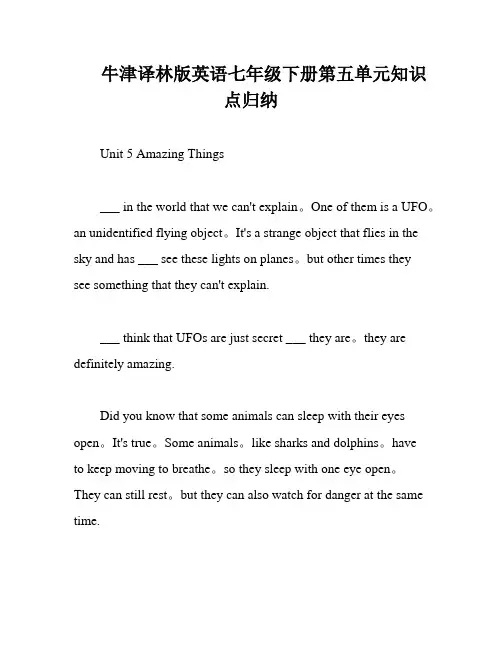
牛津译林版英语七年级下册第五单元知识点归纳Unit 5 Amazing Things___ in the world that we can't explain。
One of them is a UFO。
an unidentified flying object。
It's a strange object that flies in the sky and has ___ see these lights on planes。
but other times they see something that they can't explain.___ think that UFOs are just secret ___ they are。
they are definitely amazing.Did you know that some animals can sleep with their eyes open。
It's true。
Some animals。
like sharks and dolphins。
haveto keep moving to breathe。
so they sleep with one eye open。
They can still rest。
but they can also watch for danger at the same time.___ amazing animals。
Did you know that their feet are times larger than a human foot。
And did you know that they have special pads on the back of their feet that help them walk quietly。
These are just some fun ___.Sometimes we see something unusual and we can't explain it。
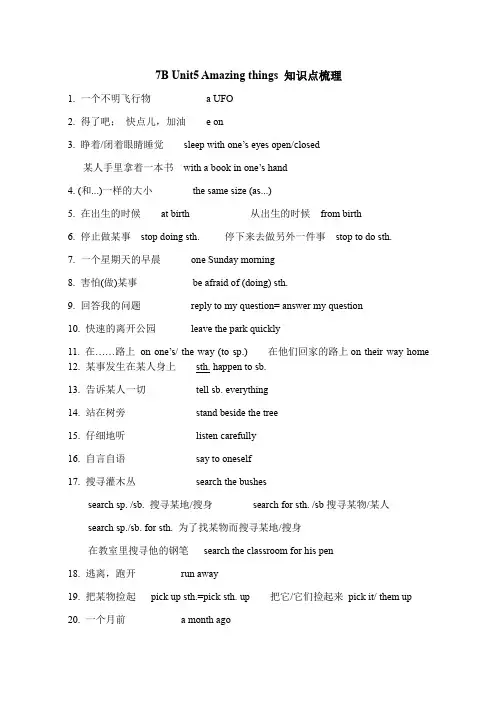
7B Unit5 Amazing things 知识点梳理1. 一个不明飞行物 a UFO2. 得了吧;快点儿,加油 e on3. 睁着/闭着眼睛睡觉sleep with one’s eyes open/closed某人手里拿着一本书with a book in one’s hand4. (和...)一样的大小the same size (as...)5. 在出生的时候at birth 从出生的时候from birth6. 停止做某事stop doing sth. 停下来去做另外一件事stop to do sth.7. 一个星期天的早晨one Sunday morning8. 害怕(做)某事be afraid of (doing) sth.9. 回答我的问题reply to my question= answer my question10. 快速的离开公园leave the park quickly11. 在……路上on one’s/ the way (to sp.) 在他们回家的路上on their way home12. 某事发生在某人身上sth. happen to sb.13. 告诉某人一切tell sb. everything14. 站在树旁stand beside the tree15. 仔细地听listen carefully16. 自言自语say to oneself17. 搜寻灌木丛search the bushessearch sp. /sb. 搜寻某地/搜身search for sth. /sb搜寻某物/某人search sp./sb. for sth. 为了找某物而搜寻某地/搜身在教室里搜寻他的钢笔search the classroom for his pen18. 逃离,跑开run away19. 把某物捡起pick up sth.=pick sth. up 把它/它们捡起来pick it/ them up20. 一个月前 a month ago21. 对……感到吃惊be surprised at … 惊讶地做某事be surprised to do sth.22. 到达博物馆get to the museum23. 在博物馆度过三小时spend three hours in the museum24. 买动物卡片buy cards of the animals25. 拍许多照take a lot of photos (of...)26. 只有11厘米高only 11 centimetres tall27. 了解一些奇怪的鸟learn/know about some strange birds28. 更多地了解动物know/learn more about animals29. 写一封感谢信给某人write a thankyou letter to sb.30. 保持我们的房子干净keep our house clean31. 一支粉笔 a piece of chalk32. 在一家博物馆外面outside a museum33. 和某人说话talk to sb.34. 观看一场短电影watch a short film35. 展示世界上很多神奇的事物show a lot of amazing things in the world36. 得名于get one’s name from...37. 一个叫做约翰的人 a man called John38. 很喜欢打牌love playing cards very much39. 喜欢三明治like sandwiches40. 吃相同的食物eat the same food41.第一次电视表演the first TV show42. 请求;要ask for 寻求某人帮助ask sb. for help43. as … as 像……一样(中间必须接形容词或者副词的原级)否定形式是not as/so … as ...现在电视可以大到152英寸。
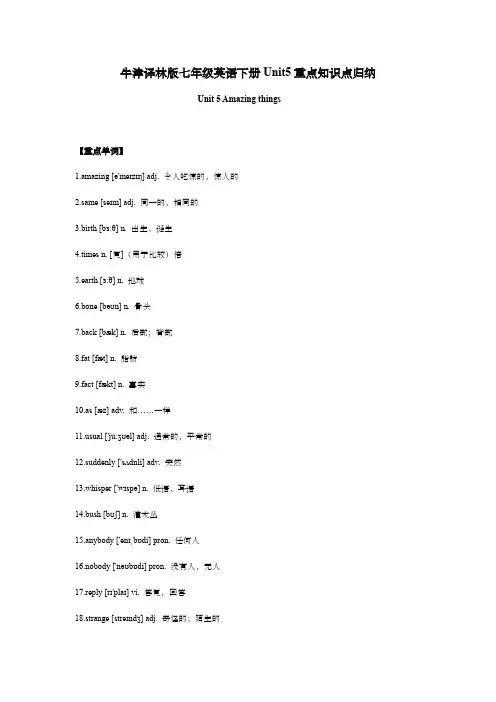
牛津译林版七年级英语下册Unit5重点知识点归纳Unit 5 Amazing things【重点单词】1.amazing [ə'meɪzɪŋ] adj. 令人吃惊的,惊人的2.same [seɪm] adj. 同一的,相同的3.birth [bɜːθ] n. 出生,诞生4.times n. [复](用于比较)倍5.earth [ɜːθ] n. 地球6.bone [bəʊn] n. 骨头7.back [bæk] n. 后部;背部8.fat [fæt] n. 脂肪9.fact [fækt] n. 事实10.as [æz] adv. 和……一样ual ['juːʒʊəl] adj. 通常的,平常的12.suddenly ['sʌdnli] adv. 突然13.whisper ['wɪspə] n. 低语,耳语14.bush [bʊʃ] n. 灌木丛15.anybody ['enɪˌbɒdi] pron. 任何人16.nobody ['nəʊbɒdi] pron. 没有人,无人17.reply [rɪ'plaɪ] vi. 答复,回答18.strange [streɪndʒ] adj. 奇怪的;陌生的19.leave [liːv] vt. 离开20.quickly ['kwɪkli] adv. 迅速地,飞快地21.happen ['hæpən] vi. 发生22.everything ['evrɪθɪŋ] pron. 每件事,每样事物,一切23.wonder ['wʌndə] vi.& vt. 琢磨,想知道;感到诧异24.carefully ['keəfəli] adv. 仔细地,认真地;小心地25.search [sɜːtʃ] vt.& vi. 搜查,搜寻,搜索26.himself [hɪm'self] pron. 他自己27.weak [wiːk] adj. 虚弱的,无力的28.pick [pɪk] vt. 拾起29.surprised [sə'praɪzd] adj. 吃惊的,惊讶的ter ['leɪtə] adv. 随后,后来31.somebody ['sʌmbədi] pron. 某人,有人32.ago [ə'gəʊ] adv. 以前33.centimeter ['sentɪmiːtə(r)] n. (=cm) <英>厘米,公分34.dodo ['dəʊdəʊ] n. 渡渡鸟35.snake [sneɪk] n. 蛇36.camel ['kæm(ə)l] n. 骆驼37.ant [ænt] n. 蚂蚁38.little ['lɪtl] pron.&det. 不多的,少数的39.dry [draɪ] adj. 干的;干燥的40.without [wɪ'ðaʊt] prep. 没有41.chalk [tʃɔːk] n. 粉笔42.sandwich ['sændwɪtʃ] n. 三明治43.by [baɪ] prep. 不迟于,在……之前44.per [pə] prep. 每,每一45.inch [ɪntʃ] n. 英寸【重点短语】1.look at the bright lights on the plane 看看飞机上的亮灯2.as usual 和平常一样3.say to himself 他自言自语4.on one’s/the way to someplace 在去某地的路上5.pick up 捡起,拾起6.run away quickly 迅速逃跑7.live on the ground 生活在陆地上8.travel around the world by bicycle 骑自行车环游世界9.a man called/named+姓名一个名叫……的人10.stop for meals 停下来吃饭11.become popular all over the world 在全世界变得很受欢迎12.at least至少13.turn around 转身14.turn on/off 打开/关掉15.turn up/down 把声音调大/调小16.as large as和……一样大17.be weak in sth. 在某方面差18.ask for请求,要19.draw 3-D pictures with chalk 用粉笔画3D图画20.stop doing sth. 停止做某事21.sth. happen to sb. 某人发生某事22.sb. happen to do sth. 某人碰巧做某事23.search +地点+for+物在某个地方找某物24.be surprised to do sth. 做某事很惊讶25.one…the other... (两者中的)一个……另一个……26.not…any more 不再,再也不【重点句型】1.Fish sleep with their eyes open.鱼睁着眼睛睡觉。
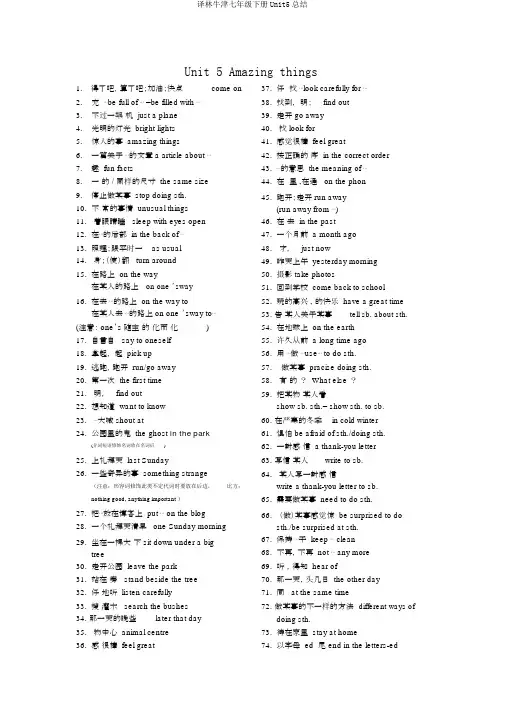
Unit 5 Amazing things1. 得了吧,算了吧;加油;快点come on2.充⋯be full of ⋯ =be filled with ⋯3.不过一架机 just a plane4.光明的灯光 bright lights5.惊人的事 amazing things6.一篇关于⋯的文章 a article about ⋯7.趣 fun facts8.一的 / 同样的尺寸 the same size9.停止做某事 stop doing sth.10.不常的事情 unusual things11.着眼睛睡 sleep with eyes open12.在⋯的后部 in the back of ⋯13.照理;跟平时一 as usual14.身;(使)翻 turn around15.在路上 on the way在某人的路上on one ’sway16.在去⋯的路上 on the way to在某人去⋯的路上 on one ’sway to⋯(注意: one’s随主的化而化)17.自言自 say to oneself18.拿起,起 pick up19.逃跑,跑开 run/go away20.第一次 the first time21.明, find out22.想知道 want to know23.⋯大喊 shout at24.公园里的鬼 the ghost in the park(介词短语修饰名词放在名词后)25.上礼拜天 last Sunday26.一些奇异的事 something strange(注意:形容词修饰此类不定代词时要放在后边,比方;nothing good, anything important )27.把⋯放在博客上 put ⋯ on the blog28.一个礼拜天清早 one Sunday morning29.坐在一棵大下 sit down under a bigtree30.走开公园 leave the park31.站在旁 stand beside the tree32.仔地听 listen carefully33.搜灌木 search the bushes34. 那一天的晚些later that day35.物中心 animal centre36.感很棒 feel great 37.仔找⋯look carefully for ⋯38.找到,明; find out39.走开 go away40.找 look for41.感觉很棒 feel great42.按正确的序 in the correct order43.⋯的意思 the meaning of ⋯44.在里 ,在通 on the phon45.跑开;走开 run away(run away from ⋯)46.在去 in the past47.一个月前 a month ago48.才, just now49.昨天上午 yesterday morning50.摄影 take photos51.回到学校 come back to school52.玩的高兴 ,的快乐 have a great time53. 告某人关于某事tell sb. about sth.54.在地球上 on the earth55.许久从前 a long time ago56.用⋯做⋯use⋯ to do sth.57.做某事 pracise doing sth.58.有的? What else ?59.把某物某人看show sb. sth.= show sth. to sb.60. 在严寒的冬季in cold winter61.惧怕 be afraid of sth./doing sth.62.一封感信 a thank-you letter63. 写信某人write to sb.64.某人写一封感信write a thank-you letter to sb.65.需要做某事 need to do sth.66.(做)某事感觉惊 be surprised to dosth./be surprised at sth.67.保持⋯干 keep ⋯ clean68.不再,不再 not ⋯ any more69.听,得知 hear of70.那一天,头几日 the other day71.同 at the same time72. 做某事的不一样的方法different ways ofdoing sth.73.待在家里 stay at home74.以字母 ed 尾 end in the letters-ed75.在博物外面 outside the museum76.注意 / 留神做某事 pay attention to do sth.77.一分前 just a minute ago78.今日的快乐 enjoy the day79. 打算 / 划做某事plan to do sth.80.打牌 play cards81.全球 all over the world82.在使用中 in use83.最少 at least84.像⋯一 as⋯as85.求 ask for1.世界上充了惊人的事物。
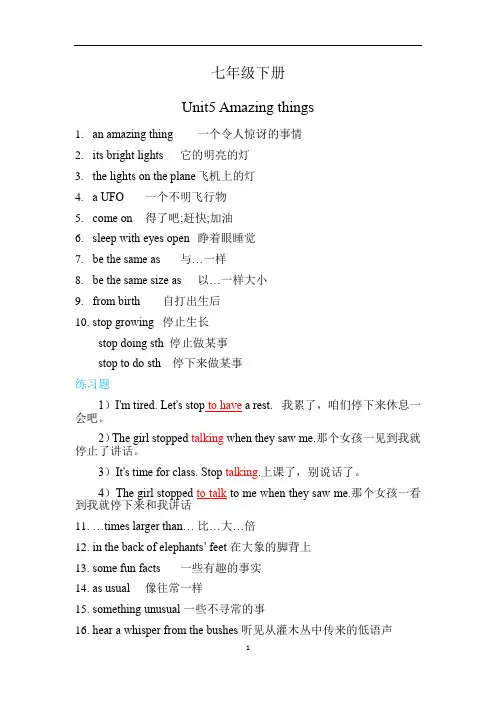
七年级下册Unit5 Amazing things1.an amazing thing一个令人惊讶的事情2.its bright lights它的明亮的灯3.the lights on the plane飞机上的灯4. a UFO一个不明飞行物e on得了吧;赶快;加油6.sleep with eyes open睁着眼睡觉7.be the same as与…一样8.be the same size as以…一样大小9.from birth自打出生后10.stop growing停止生长stop doing sth 停止做某事stop to do sth 停下来做某事练习题1)I'm tired. Let's stop to have a rest.我累了,咱们停下来休息一会吧。
2)The girl stopped talking when they saw me.那个女孩一见到我就停止了讲话。
3)It's time for class. Stop talking.上课了,别说话了。
4)The girl stopped to talk to me when they saw me.那个女孩一看到我就停下来和我讲话11.…times larger than…比…大…倍12.in the back of elephants’ feet在大象的脚背上13.some fun facts一些有趣的事实14.as usual像往常一样15.something unusual一些不寻常的事16.hear a whisper from the bushes听见从灌木丛中传来的低语声17.turn around转身;掉头18.I saw nothing.= I didn’t see anything.我什么也看见19.hear sb do/doing sth 听见某人做了/正在某事20.reply to回答;答复21.be afraid of (doing) sth害怕(做)某事be afraid to do sth害怕做某事22.on one’s/ the way to sp在去某地的路上23.on one’s/ the way home/here/there在回家/在来这儿/在去那儿的路24.What happened to you?你怎么啦?25.listen to me carefully认真听我26.take (good) care of…=look after…(well) (好好)照顾……27.say to oneself自言自语28.sound like a whisper听起来像一个低语声29.pick up捡起30.pick it up把它捡起来31.be surprised to do sth 惊讶做某事ter that day那天晚些时候33.take the cat the animal centre带小猫去动物中心34.find out查明35.run away quickly快速跑开36.tell sb about sth告诉某人关于某事37.take a lot of photos拍了许多照片38.cards of the animals动物的卡片39.the day before yesterday前天40.have a good/great/nice time玩得开心41.eat little food吃很少的食物42.for months数月43.for a long time很久(提问用how long)44.smell things well嗅觉很好45.smell good闻起来很好46.know more about sth了解更多关于……47.live in dry places生活在干燥的地方48.hear of听说(过)…49.travel around…游历…50.the other day前些日子,日前51.write with one hand用一只手书写52.draw 3-D pictures with chalk用粉笔画三维图片53.at the same time同时54.be surprised to do sth 做某事感到惊讶55.keep sb/sb +adj保持某人/某物+形容词56.keep our house clean保持我们的屋子干净57.not …any more=no more不再58.a man called …一个名叫…的人59.stop for meals停下来吃饭60.put meat between two pieces of bread把肉放在两块面包之间61.be popular with/among…在……人中很受欢迎62.all over the world全世界63.the first TV show第一个电视节目64.in use在使用中65.at least /at most至少/ 最多66.ask for sth 要某物ask sb for sth 向某人要某物(例:My teach asked me to finish the task tomorrow 老师让我明天完成任务)语法一般过去时表示过去某一时刻或某一时间段内发生的动作或存在的状态,过去时间标志词:(1)yesterday系列:yesterday,yesterday morning ,yesterday afternoon ,yesterday evening, the day before yesterday(2)last系列:last week, last month, last year, last night(3)ago系列:two months ago, three years ago(4)in系列:in 1990, in 2012特殊:just now ,in the past等等。
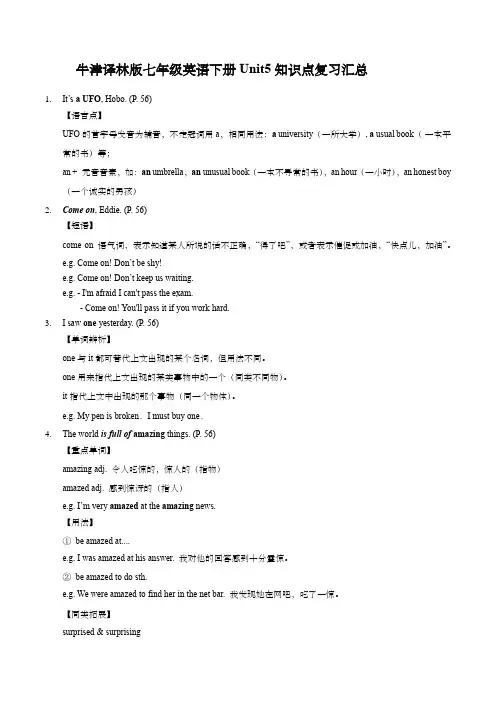
牛津译林版七年级英语下册Unit5知识点复习汇总1.It’s a UFO, Hobo. (P. 56)【语言点】UFO的首字母发音为辅音,不定冠词用a,相同用法:a university(一所大学), a usual book(一本平常的书)等;an + 元音音素,如:an umbrella,an unusual book(一本不寻常的书),an hour(一小时),an honest boy (一个诚实的男孩)e on, Eddie. (P. 56)【短语】come on 语气词,表示知道某人所说的话不正确,“得了吧”,或者表示催促或加油,“快点儿,加油”。
e.g. Come on! Don’t be shy!e.g. Come on! Don’t keep us waiting.e.g. - I'm afraid I can't pass the exam.- Come on! You'll pass it if you work hard.3.I saw one yesterday. (P. 56)【单词辨析】one与it都可替代上文出现的某个名词,但用法不同。
one用来指代上文出现的某类事物中的一个(同类不同物)。
it指代上文中出现的那个事物(同一个物体)。
e.g. My pen is broken.I must buy one.4.The world is full of amazing things. (P. 56)【重点单词】amazing adj. 令人吃惊的,惊人的(指物)amazed adj. 感到惊讶的(指人)e.g. I’m very amazed at the amazing news.【用法】①be amazed at....e.g. I was amazed at his answer. 我对他的回答感到十分震惊。
②be amazed to do sth.e.g. We were amazed to find her in the net bar. 我发现她在网吧,吃了一惊。
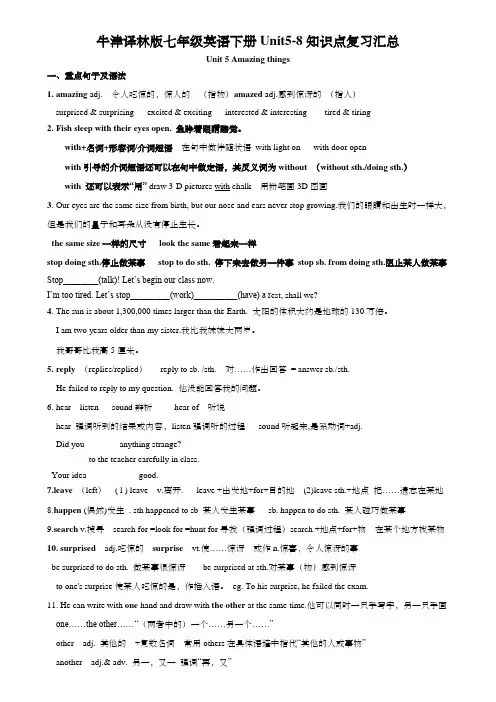
牛津译林版七年级英语下册Unit5-8知识点复习汇总Unit 5 Amazing things一、重点句子及语法1. amazing adj. 令人吃惊的,惊人的(指物)amazed adj.感到惊讶的(指人)surprised & surprising excited & exciting interested & interesting tired & tiring2. Fish sleep with their eyes open. 鱼睁着眼睛睡觉。
with+名词+形容词/介词短语在句中做伴随状语with light on with door openwith引导的介词短语还可以在句中做定语,其反义词为without (without sth./doing sth.)with 还可以表示“用” draw 3-D pictures with chalk 用粉笔画3D图画3. Our eyes are the same size from birth, but our nose and ears never stop growing.我们的眼睛和出生时一样大,但是我们的鼻子和耳朵从没有停止生长。
the same size一样的尺寸look the same看起来一样stop doing sth.停止做某事stop to do sth. 停下来去做另一件事stop sb. from doing sth.阻止某人做某事Stop________(talk)! Let’s begin our class now.I’m too tired. Let’s stop_________(work)__________(have) a r est, shall we?4. The sun is about 1,300,000 times larger than the Earth. 太阳的体积大约是地球的130万倍。
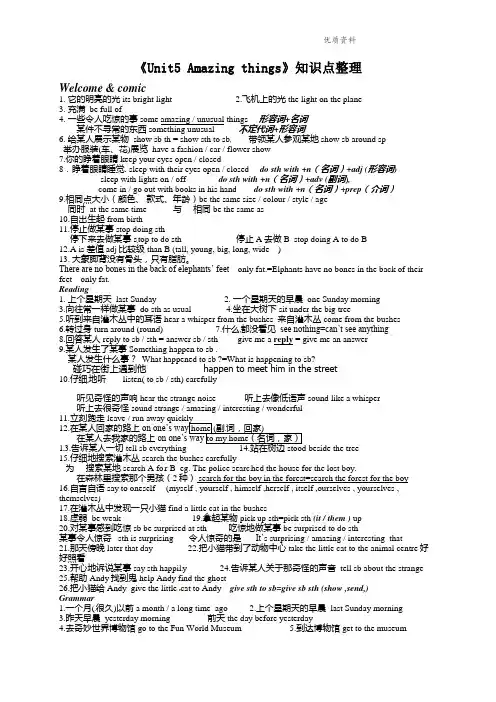
《Unit5 Amazing things》知识点整理Welcome & comic1. 它的明亮的光 its bright light2.飞机上的光the light on the plane3. 充满 be full of4. 一些令人吃惊的事some amazing / unusual things 形容词+名词某件不寻常的东西something unusual 不定代词+形容词6. 给某人展示某物 show sb th = show sth to sb带领某人参观某地 show sb around sp举办服装(车、花)展览 have a fashion / car / flower show7.你的睁着眼睛keep your eyes open / closed8.睁着眼睛睡觉. sleep with their eyes open / closed do sth with +n(名词)+adj (形容词)sleep with lights on / off do sth with +n(名词)+adv (副词)come in / go out with books in his hand do sth with +n(名词)+prep(介词)9.相同点大小(颜色、款式、年龄)be the same size / colour / style / age同时 at the same time 与----相同 be the same as10.自出生起 from birth11.停止做某事 stop doing sth停下来去做某事 s top to do sth 停止A去做B stop doing A to do B12.A is 差值 adj比较级 than B (tall, young, big, long, wide---)13. 大象脚背没有骨头,只有脂肪。
There are no bones in the back of elephants’ feet---only fat.=Elphants have no bones in the back of theirfeet---only fat.Reading1. 上个星期天 last Sunday2. 一个星期天的早晨 one Sunday morning3.向往常一样做某事 do sth as usual4.坐在大树下sit under the big tree5.听到来自灌木丛中的耳语 hear a whisper from the bushes 来自灌木丛 come from the bushes6.转过身 turn around (round)7.什么都没看见see nothing=can’t see anything8.回答某人reply to sb / sth = answer sb / sth give me a reply = give me an answer9.某人发生了某事Something happen to sb .某人发生什么事? What happened to sb ?=What is happening to sb?碰巧在街上遇到他 happen to meet him in the street10.仔细地听----- listen( to sb / sth) carefully听见奇怪的声响 hear the strange noise 听上去像低语声sound like a whisper听上去很奇怪sound strange / amazing / interesting / wonderful---11.立刻跑走 leave / run away quickly12.在某人回家的路上on one’s way home (副词,回家)在某人去我家的路上on one’s way to my home(名词,家)13.告诉某人一切tell sb everything 14.站在树边 stood beside the tree15.仔细地搜索灌木丛 search the bushes carefully为----搜索某地search A fo r B eg. The police searc hed the house for the lost boy.在森林里搜索那个男孩(2种) search for the boy in the forest=search the forest for the boy16.自言自语 say to oneself (myself , yourself , himself ,herself , itself ,ourselves , yourselves ,themselves)17.在灌木丛中发现一只小猫 find a little cat in the bushes18.虚弱 be weak 19.拿起某物 pick up sth=pick sth (it / them ) up20.对某事感到吃惊 sb be surprised at sth 吃惊地做某事be surprised to do sth某事令人惊奇 sth is surprising 令人惊奇的是-----It’s surprising / amazing / interesting that21.那天傍晚later that day 22.把小猫带到了动物中心 take the little cat to the animal centre好好照看23.开心地诉说某事say sth happil y 24.告诉某人关于那奇怪的声音 tell sb about the strange25.帮助Andy找到鬼 help Andy find the ghost26.把小猫给Andy give the little cat to Andy give sth to sb=give sb sth (show ,send,)Grammar1.一个月(很久)以前 a month / a long time ago2.上个星期天的早晨 last Sunday morning3.昨天早晨 yesterday morning 前天 the day before yesterday4.去奇妙世界博物馆go to the Fun World Museum5.到达博物馆 get to the museum6.在博物馆度过3小时spend three hours in the museum7.拍大量的照片take a lot of photos8.我们中的一些人some of us9.买了一些动物卡片buy cards of the animals 10.返回学校come back to school 11.玩的开心Havea great time12.告诉我关于这事的全部Tell me all about it13.只有11厘米高 a long time ago 14.其他还有什么?what else?15.学一些类似渡渡鸟的奇怪鸟类 learn about some strange birds like dodos16.住在地球上live on the earth / ground // live in trees / water / in very dry placeIntegrated skills1.向某人展示一些动物的图片Show sb some pictures of animals2.害怕动物Be afraid of animals3.一些有关动物的有趣的事情Some interesting things about animals对----感兴趣Be interested in sth4.长长脖子Have a long neck5.在寒冷的冬天吃的很少或几乎不吃Eat little or nothing for in cold winter6.没有---也能活很长一段时间Live without for a long time7.嗅觉灵敏 Smell things well闻起来很香Smell good / delicious8.给某人写封感谢信 write a thank-you letter to sb9.谢谢你的帮助thank you for your help10.对动物了解更多know more about animals11.需要保持房屋干净need to keep our house clean keep sth adj12.不再-----not---any more13.更多的了解他们learn / know more about them15.听说某人hear of sb / sth16.骑车环游80多个国家travel around over 80 countries by bike17.第二天the other day18.用一只手写字write with one hand19.用另一只手画画draw with the other hand20.同时做某事do A and do B at the same time21.用粉笔画3-D图画draw 3-D pictures with chalksStudy skills1. 在博物馆外遇见某人Meet sb outside a museum2.博物馆一分钟前关门了。
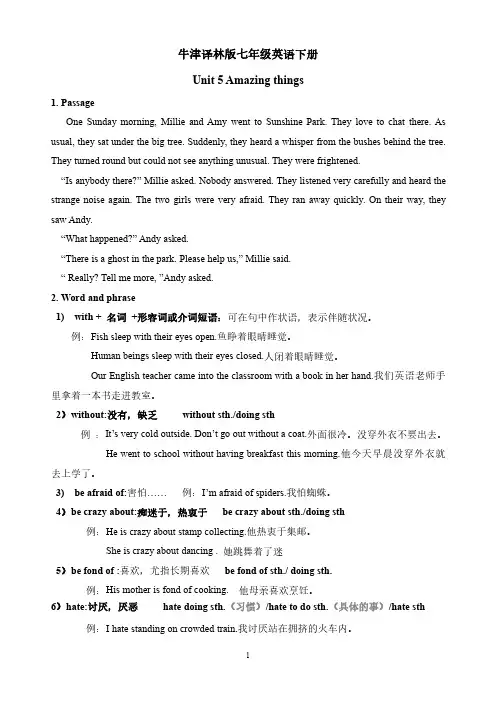
牛津译林版七年级英语下册Unit5Amazing things1.PassageOne Sunday morning,Millie and Amy went to Sunshine Park.They love to chat there.As usual,they sat under the big tree.Suddenly,they heard a whisper from the bushes behind the tree. They turned round but could not see anything unusual.They were frightened.“Is anybody there?”Millie asked.Nobody answered.They listened very carefully and heard the strange noise again.The two girls were very afraid.They ran away quickly.On their way,they saw Andy.“What happened?”Andy asked.“There is a ghost in the park.Please help us,”Millie said.“Really?Tell me more,”Andy asked.2.Word and phrase1)with+名词+形容词或介词短语:可在句中作状语,表示伴随状况。
例:Fish sleep with their eyes open.鱼睁着眼睛睡觉。
Human beings sleep with their eyes closed.人闭着眼睛睡觉。
Our English teacher came into the classroom with a book in her hand.我们英语老师手里拿着一本书走进教室。
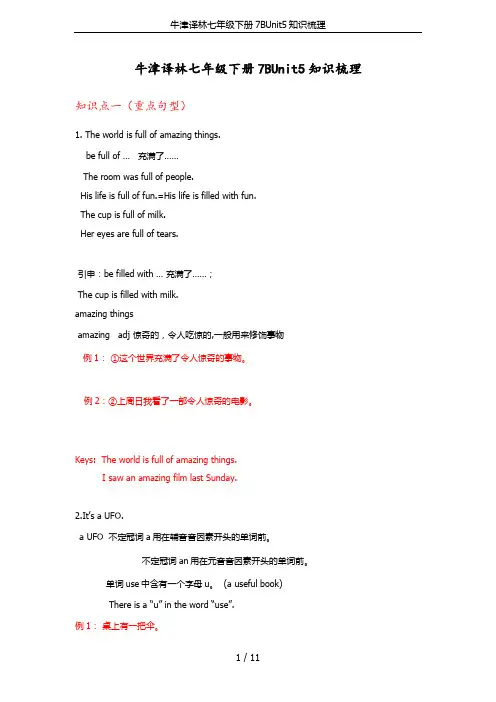
牛津译林七年级下册7BUnit5知识梳理知识点一(重点句型)1. The world is full of amazing things.be full of … 充满了……The room was full of people.His life is full of fun.=His life is filled with fun.The cup is full of milk.Her eyes are full of tears.引申:be filled with … 充满了……;The cup is filled with milk.amazing thingsamazing adj 惊奇的,令人吃惊的,一般用来修饰事物例1:①这个世界充满了令人惊奇的事物。
例2:②上周日我看了一部令人惊奇的电影。
Keys: The world is full of amazing things.I saw an amazing film last Sunday.2.It’s a UFO.a UFO 不定冠词a用在辅音音因素开头的单词前。
不定冠词an用在元音音因素开头的单词前。
单词use中含有一个字母u。
(a useful book)There is a “u” in the word “use”.例1:桌上有一把伞。
Key: There is an umbrella on the desk.3. Fish sleep with their eyes open.介词短语 with their eyes open在句中做伴随状语。
其结构是with+名词/代词+宾补(形容词)”①without + prep.Man can’t live without water.I’d like the coffee without nothing in it.②Without+ doing sth.He went to school without having breakfast.We can drink water without getting fat.例1:睡觉时不要开窗户/关窗户。
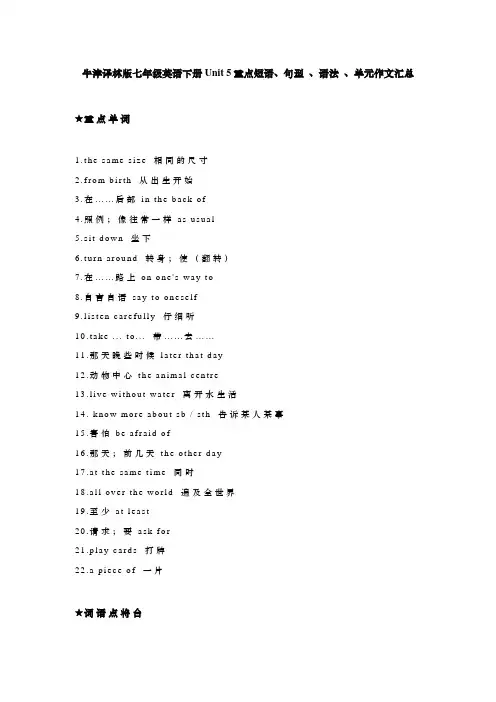
牛津译林版七年级英语下册Unit 5重点短语、句型、语法、单元作文汇总★重点单词1.t h e s a m e s i z e相同的尺寸2.f r o m b i r t h从出生开始3.在……后部i n t h e b a c k o f4.照例;像往常一样a s u s u a l5.s i t d o w n坐下6.t u r n a r o u n d转身;使(翻转)7.在……路上o n o n e's w a y t o8.自言自语s a y t o o n e s e l f9.l i s t e n c a r e f u l l y仔细听10.t a k e ...t o...带……去……11.那天晚些时候l a t e r t h a t d a y12.动物中心t h e a n i m a l c e n t r e13.l i v e w i t h o u t w a t e r离开水生活14.k n o w m o r e a b o u t s b/s t h告诉某人某事15.害怕b e a f r a i d o f16.那天;前几天t h e o t h e r d a y17.a t t h e s a m e t i m e同时18.a l l o v e r t h e w o r l d遍及全世界19.至少a t l e a s t20.请求;要a s k f o r21.p l a y c a r d s打牌22.a p i e c e o f一片★词语点将台★b i r t hb i r t h为名词,意为“出生,诞生”。
a t b i r t h意为“在出生时”;g i v e b i r t h t o意为“生(孩子)”。
【例句】1.H i s b r o t h e r i s d e a f f r o m b i r t h.他的弟弟一出生就失聪了。
牛津译林版七年级英语下册Unit 5 Amazing thingsA Welcome to the unit1 Look at it.: Look at the picture\room\sth Look there\here(go)Look 作联系动词,“看上去,看起来”:You look tird.\young.\old固定搭配:look after(well)=take (good) care of2 It’s a UFO.UFO= Unidentified Flying Object名词前不定冠词a, an 的使用:名词的首字母发音为元音音素,用an:An apple an orange an English boy an egg an hourThere is an “h” in the word “hour”.名词的首字母发音为辅音音素,用aA desk a pen a book a useful idea3 Come on, Eddie.Come on , don’t sit there dreaming.(得啦,算了吧)Come on, Let’s hurry.(表示催促,快来吧)Come on, Tom! Jack is catching up.(加油)4 Look at its bright lights.Bright: 形容词,明亮的,浅色的名词,光线Our classroom is very bright.Don’t look at the powerful light. It’s bad for your eyes.Of all the rooms, I like the light one best.Jim likes dark blue and his twin brother likes light blue副词:brightly5 The world is full of amazing thingsBe full of sth 充满…….=be filled with sthBe full 某人饱了某物满了The glass is full of milk= The glass is filled with milk.The glass is full. I’m full.6 amazing 的用法形容词:令人惊奇的,令人感到吃惊的,主语通常为某事物They finished the work at an amazing speed.I find it amazing that you can’t swim.Amazed: 形容词,感到惊奇的Be amazed at be amazed by be amazed to do be amazed (that)I’m amazed that you have never been to Beijing .I’m amazed to see him here.7 show sb sth= show sth to sbShow sb around(round)I will show you the book tomorrow= I will show the book to you tomorrow.I will show you around our school this afternoon.Show 做名词表示展示,秀,演出The movie is now showing at all major movie theaters.8 Fish sleep with their eyes open.Fish : 表示不同种类的鱼是是可数名词,加es。
牛津译林版Unit 5 知识点复习1.amazing/amazedamazing,adj. “令人吃惊的,惊人的”,说明事物所具有的特征,通常用于修饰事物。
amazed,adj. “吃惊的,惊奇的”,多说明人的感受,用来说明人。
2.Fish sleep with their eyes open. 鱼睁着眼睛睡觉“with+名词+形容词/介词短语”,在句中作伴随状语。
3.same adj. “同一的;相同的”be the same as..“和……一样”the same...as... “和……一样的……”反义:different ;be different from “与……不同”4.birth n. “出生,诞生”at birth “出生时”from birth “从出生时”5.stop “停止”stop doing sth. “停止正在做的事情”stop to do sth. “停下来去做另一件事”6.timen. “时间(不可数)”“次数(可数)”“倍”once 一次;twice 两次;three/four/five times 三次/四次/五次7.back n.“后部,背部”at the back of/in the back of “在……的后部/背部”adv. “回到原处,回复,回应”go back to... “回到……”;call sb. back “回电话”8.fat不可数名词,“脂肪”。
adj. “肥胖的”。
反义:thin。
9.fact n. “事实”fun facts “趣闻,有趣的事”in fact “事实上”ual adj. “通常的,平常的”反义:unusual “不寻常的”usually adv. “通常,经常”as usual “和往常一样”11.suddenly adv. “突然”sudden adj. “突然的;出乎意料的”12.replay v. “回答;回复”(= answer)过去式:repliedreply to... “对……作出回答”13.strange adj. “奇怪的;陌生的”be strange to sb./sth. “对某人/某事物感到陌生”stranger “陌生人”14.leave v. “离开”leave from... “从……离开”leave for “动身去……”leave...for... “离开……去……”15.wayon the way to... “去……的路上”by the way “顺便问一下”in this way“用这种方式”lose one’s way “迷路”16.happen不及物动词,“发生”,主语常为事,而不是人。
Unit 5 Amazing things5.1 Comic strip&Welcome to the unit【要点梳理】1.词汇运用2.句子结构分析要点一:词汇1. amazing adj. 令人惊异的,惊人的区别amazing和amazedamazing 令人吃惊的,主语习惯上是物(事)。
如:Your success is amazing. amazed 感到惊奇(愕),主语习惯上是人,be amazed at.... be amazed to do sth.【例】I was amazed at his answer. 我对他的回答感到十分震惊。
We were amazed to find her in the net bar. 我发现她在网吧,吃了一惊。
【拓展】以ing及ed结尾的相同用法的形容词还有interesting exciting frighteninginterested excited frightened2.same adj. 同一的;相同的,同样的pron.同一事物;同样的人the same as 同……一样all the same 完全一样about the same 大同小异【例】We share the same social background. 我们有相同的社会背景。
They study in a same school.他们在同一所学校上学3. birth n.出生;分娩;起源;出身at birth 出生时by birth 生来,天生【例】She gave a birth to a girl.She weighed 5 pounds at birth.要点二:句子结构1.I saw one yesterday.我昨天还见过一架(飞机)。
one与it都可替代上文出现的某个名词,但用法不同。
one用来指代上文出现的某类事物中的一个(同类不同物)。
it指代上文中出现的那个事物(同一个物体)。
【例】:My pen is broken.I must buy one.2.Fish sleep with their eyes open.鱼睁着眼睛睡觉。
“with+名词+形容词/介词短语/分词短语”结构在句中作伴随状语,表示伴随前一个动作而存在的状态。
【例】My English teacher came into the classroom with a book in his right hand.3.Our eyes are the same size from birth,but our nose and ears never stop growing.stop doing sth. 意为“停止(正在)做的事情”stop to do sth. 意为“停止(正在做的事)去做某事”【例】The baby stopped crying and listened to the music. 婴儿停止了哭叫,听起了音乐。
How about stopping to drink some coffee? 停下来喝些咖啡,好吗?【注意】remember t o do sth. 意为“记住(要)做某事”,这件事还没有做;remember doing sth. 意为“记得做过某事”,这件事已做过。
4.The Sun is about 1,300,000 times larger than the Earth.太阳的体积是地球的约130万倍。
than是用于两者作比较的介词,其前用形容词或副词的比较级形式。
larger是形容词lager的比较级。
【例】I’m taller than Jim.5.Isn’t that amazing?难道那不令人惊奇吗?此句是否定疑问句,可译为“难道不……吗? ”回答时要注意:若情况是肯定的就用yes回答,反之用no回答。
【例】一Can’t you see it?难道你没看到吗?一Yes,I can./No,I can’t.不,我看到了。
/是的,我没看到。
5.2 Reading【要点梳理】1.重点词汇分析2.句子结构剖析要点一:词汇1.reply vi. 答复,回答reply to sb. 回答某人reply to a question 回答问题make no reply 不作答复【例】I sent in my application, and the university replied to me at once.She replied that she disagreed. 她回答说她不同意。
2.leave v. 离开;过去式:leftleave sp.意为“离开某地”;leave for sp.意为“动身去某地”;leave A for B意为“离开A地去B地”。
leave作动词,还可表示“使……处于某种状态;忘记”【例】His father leaves home at 6:00 every morning.My brother is leaving Suzhou for Shanghai tomorrow.Don't leave the water running when you brush your teeth .Tom left his English book at home yesterday.3.wonder vt.感到诧异;想弄明白vi. 想知道;惊讶no wonder 难怪,不足为奇wonder about (at) 对……感到诧异【例】I wonder who did it4. search v. 搜寻,搜索;调查;搜查;探求search指“搜查某地或搜身”search for指“搜寻、搜索某人或某物”=look for。
search后还可接要搜查的地方,即search…for sth. / sb. 意为“在……处搜寻某物/人”。
【例】The police searched his clothes but found nothing.All night they searched for the lost necklace.She searched her desk for the necessary information.5.weak adj.柔弱的,虚弱的;无力的,软弱的the weak 弱者(复数)be weak in 在……方面比较差【例】She was weak after her illness. 她病后很虚弱。
He is weak in English reading. 他在英语阅读方面比较弱。
6.surprised adj. 吃惊的,惊讶的be surprised at sth./sb.对某事/某人感到惊讶;be surprised to do sth. 做某事感到吃惊;be surprised that 从句in surprise 惊奇地;to one’s surprise 使某人惊奇的是。
【例】I am surprised at seeing / to see her there.I am surprised that he failed in the exam again.What a surprise!7.little pron. 少数的,不多的【例】I had little money and little free time.The little girl over there is my cousin.区别little,a little, few ,a few8. without prep.没有,缺乏(+doing sth.)【例】He often goes to school without (having)breakfast . 他经常不吃早饭就去上学。
区别without/withwithout 作介词,意为“无,没有”。
Without water Man can’t live.I couldn’t arrive there in time without your help.反义词with,意为“拥用”。
With my teacher’s help, I worked out the maths problem at last.Our headmaster came into the classroom with a smile on his face.9.turn around 转身,(使)翻转turn in 上交turn on/off 打开/关掉turn up/down 调高/调低take one’s turn 依次,轮流in turn 依次【例】If I turn around, you're behind me.Before you stop or turn around, look back and make sure your path is clear. 10.pick up 拾起,拿起pick sb up=pick up sb. 用车接某人pick out 精心挑选出,分辨出pick sth up=pick up sth拾起(捡起)某物【例】He picked his cap up from the floor and stuck it back on his head...I picked her up at Covent Garden to take her to lunch with my mother.11.be afraid 感到害怕(担心)be afraid to do sth. 害怕去做某事;be afraid of sth./doing sth. 害怕某事/做某事;be afraid that从句。
【例】The girl is afraid of dogs.I am afraid of breaking my glasses.Women are afraid to go out alone at night.= Women are afraid of going out alone at night.I’m afraid (that) I’ll be late.要点二:句子1.Nobody replied.没有人作答。
(1)nobody也是不定代词,意义上相当于not...anybody。
(2)reply是不及物动词,后接介词to,其同义词answer则是及物动词,后面无需接介词。
【例】I don’t want to reply to/answer his e-mail.我不想回复他的电子邮件。